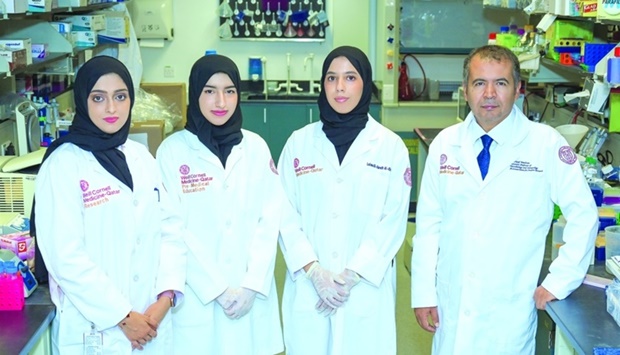A group of 31 Weill Cornell Medicine-Qatar (WCM-Q) first-year medical students were selected to pursue summer research projects in Qatar and the US, as part of their advanced biomedical sciences research elective.
The projects were student-initiated, giving them the responsibility of developing working relations with mentors and securing invitations to visit and collaborate with them on research projects.
Selected students spent the summer at WCM-Q, a variety of Weill Cornell Medicine specialised centres in New York, and with hospital partner NewYork-Presbyterian, taking part in research projects in the areas of oncology, endocrinology, neurology, paediatrics, biochemistry, neuroscience, and others.
The students were Alhanoof Aljalahma, Sara Mohamed, Omar Mourad, Wadha al-Nabti, Kevin Zhai, Hamza Rizwan, Aisha Serpedin, Momina Tareen, Mohamed Yaghmour, Abdelrahman Mostafa, Farha Shaikh, Mohamed Khalid, Alia Ashkanani, Ghalya Ashkanani, Aya Khalil, Hala Fouad, Haya al-Ansari, Ahamed Akmal Lebbe, Beshr Mushannen, Nuran Bayraktar, Hubaib Haider, Asma al-Kaabi, Safaa Elmoh, Lina al-Ani, Maryam al-Kuwari, Imane Bouhali, Deema al-Abdulla, Fatema Falamrz, Pradipta Paul, Siddhant Nair, and Zoha Baig.
Student placements at WCM-Q came under the expert supervision of faculty members Dr Rayaz Malik, professor of medicine, Dr Ziyad Mahfoud, professor of research in population health sciences, Dr Ameed Raoof, associate professor of anatomy in radiology, and Dr Ali Chaari, assistant professor of biology.
In addition, first-year premedical student al-Anood al-Athba and second-year premedical students Lulwa al-Khater and Aisha al-Hammadi, joined Dr Nayef Mazloum, assistant professor of microbiology and immunology and assistant dean for student research, for a five-week research training placement. Supervised by Dr Mazloum and mentored by Dr Aisha Madani, postdoctoral associate in microbiology & immunology, the students were introduced to various cellular and molecular techniques, including the basics of cell cultures technique, protein and RNA extraction, oil red staining for adipocytes, SDS-PAGE electrophoresis, and quantitative RT-PCR and data analysis.
Dr Thurayya Arayssi, vice-dean for academic and curricular affairs, said: “This experience will undoubtedly be a major influence on our students as they continue their medical education and begin to explore residency placements and areas of future professional interest.”
Dr Mazloum added: “The quality of the student research proposals submitted this year were truly outstanding. Students not only earned academic credits for their research projects but also had the unique opportunity to gain practical expertise and work closely with specialists at some of the world’s best medical institutions.”
The projects were student-initiated, giving them the responsibility of developing working relations with mentors and securing invitations to visit and collaborate with them on research projects.
Selected students spent the summer at WCM-Q, a variety of Weill Cornell Medicine specialised centres in New York, and with hospital partner NewYork-Presbyterian, taking part in research projects in the areas of oncology, endocrinology, neurology, paediatrics, biochemistry, neuroscience, and others.
The students were Alhanoof Aljalahma, Sara Mohamed, Omar Mourad, Wadha al-Nabti, Kevin Zhai, Hamza Rizwan, Aisha Serpedin, Momina Tareen, Mohamed Yaghmour, Abdelrahman Mostafa, Farha Shaikh, Mohamed Khalid, Alia Ashkanani, Ghalya Ashkanani, Aya Khalil, Hala Fouad, Haya al-Ansari, Ahamed Akmal Lebbe, Beshr Mushannen, Nuran Bayraktar, Hubaib Haider, Asma al-Kaabi, Safaa Elmoh, Lina al-Ani, Maryam al-Kuwari, Imane Bouhali, Deema al-Abdulla, Fatema Falamrz, Pradipta Paul, Siddhant Nair, and Zoha Baig.
Student placements at WCM-Q came under the expert supervision of faculty members Dr Rayaz Malik, professor of medicine, Dr Ziyad Mahfoud, professor of research in population health sciences, Dr Ameed Raoof, associate professor of anatomy in radiology, and Dr Ali Chaari, assistant professor of biology.
In addition, first-year premedical student al-Anood al-Athba and second-year premedical students Lulwa al-Khater and Aisha al-Hammadi, joined Dr Nayef Mazloum, assistant professor of microbiology and immunology and assistant dean for student research, for a five-week research training placement. Supervised by Dr Mazloum and mentored by Dr Aisha Madani, postdoctoral associate in microbiology & immunology, the students were introduced to various cellular and molecular techniques, including the basics of cell cultures technique, protein and RNA extraction, oil red staining for adipocytes, SDS-PAGE electrophoresis, and quantitative RT-PCR and data analysis.
Dr Thurayya Arayssi, vice-dean for academic and curricular affairs, said: “This experience will undoubtedly be a major influence on our students as they continue their medical education and begin to explore residency placements and areas of future professional interest.”
Dr Mazloum added: “The quality of the student research proposals submitted this year were truly outstanding. Students not only earned academic credits for their research projects but also had the unique opportunity to gain practical expertise and work closely with specialists at some of the world’s best medical institutions.”

